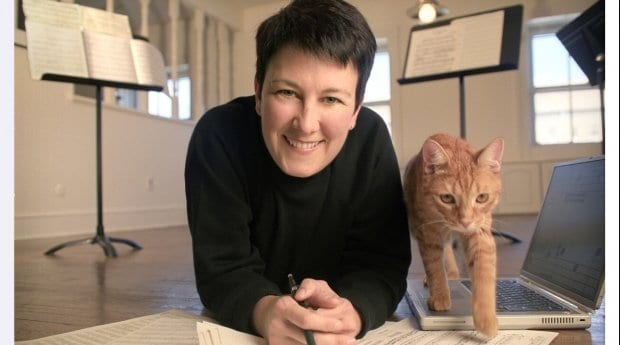One of the busiest American composers today, with commissions reaching into the year 2020, Jennifer Higdon is no stranger to Toronto. Several of her works have been performed in the city, including the Concerto for Violin and Orchestra, which was co-commissioned by the Toronto Symphony Orchestra and won her a Pulitzer Prize. She’s back this spring for the Canadian premiere of Dooryard Bloom, a work for baritone and piano quintet based on Walt Whitman’s poem “When Lilacs Last in the Dooryard Bloom’d.”
Performers play a key role in shaping Higdon’s music. “For me, it starts there. I usually know who I’m writing for. When I take a commission, it’s because I find interest in the proposed project and I want to work with the performers involved.”
Higdon describes her music as “pretty American”: “I’m told it has a strong sense of pulse. And I like melody. I believe that music should communicate: that’s probably a key thing when I write a new piece.” Dooryard Bloom is less typical. “Even though most of my music is pretty intense, this piece doesn’t carry the same intensity because the Whitman text didn’t call for that.”
Higdon grew up listening to a lot of rock and roll and folk music from the 1960s. “If there was a single greatest musical influence, it would probably be The Beatles.” Her father was a commercial artist who worked from home, and music was played around the house all the time.
She started off by playing an instrument, which led her to composing. “My flute teacher was the first person who had me write something. The moment I wrote a piece — it was a short, two-minute piece — I thought, How fantastic is this! I felt it was the right path. For me, music’s always been about exploring, and composition offered the widest palate possible.”
It had never occurred to her that composing is something women didn’t generally do. “Not a single solitary time. Actually, I attribute that to my parents; they never put any kind of limitations on my interests.” The schools she went through were also receptive. “In Bowling Green, my flute teacher was a woman; one of the composition faculty was a woman . . . As I was going through various departments, at the Curtis Institute of Music, at University of Pennsylvania, there were always women students studying composition. When I was at Penn, in fact, half of the students were women. It never occurred to me that it would be any kind of an issue. I realize now that I was very fortunate.”
She composes all the time. “The music in my mind never stops. Not even in my sleep — even then I can hear it playing. But daydreaming plays a huge part. Even when I’m walking around or sitting, I’m thinking, What would be an interesting sound to put down on the page.”
The composing process itself depends on what musical form she’s working on. With vocal works, balance is always a priority. “For opera and for works like Dooryard Bloom, you have to figure out how to get out of the way of the voice. You want to colour and highlight what the voice is doing without making the singer have to strain over the instruments.”
Baritone voice has a different colour range than, say, soprano or tenor, and further, among baritones themselves, every singer is different. All this will affect your orchestration. “You don’t want to write something that only one baritone on the planet will be able to sing,” she says with a laugh. “It’s an interesting balancing act, a real step of faith in creativity, and you only learn by doing it and studying how other composers have done it in the past.”
Jennifer Higdon’s Dooryard Bloom will premiere at 21C: Night Blooms, Sat, May 24, 8pm, at Koerner Hall, 273 Bloor St W.
Visit the Royal Conservatory’s website for more details.

 Why you can trust Xtra
Why you can trust Xtra


